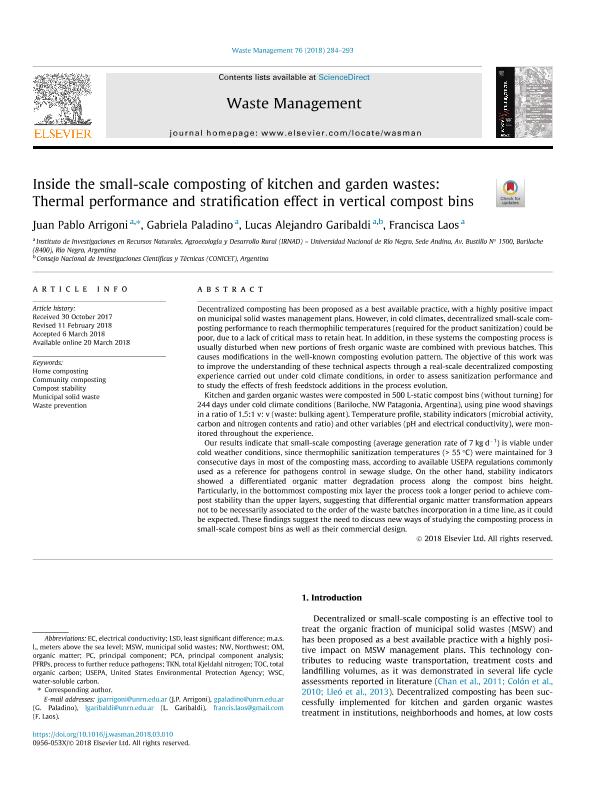Artículo
Inside the small-scale composting of kitchen and garden wastes: Thermal performance and stratification effect in vertical compost bins
Fecha de publicación:
06/2018
Editorial:
Pergamon-Elsevier Science Ltd
Revista:
Waste Management (elmsford)
ISSN:
0956-053X
Idioma:
Inglés
Tipo de recurso:
Artículo publicado
Clasificación temática:
Resumen
Decentralized composting has been proposed as a best available practice, with a highly positive impact on municipal solid wastes management plans. However, in cold climates, decentralized small-scale composting performance to reach thermophilic temperatures (required for the product sanitization) could be poor, due to a lack of critical mass to retain heat. In addition, in these systems the composting process is usually disturbed when new portions of fresh organic waste are combined with previous batches. This causes modifications in the well-known composting evolution pattern. The objective of this work was to improve the understanding of these technical aspects through a real-scale decentralized composting experience carried out under cold climate conditions, in order to assess sanitization performance and to study the effects of fresh feedstock additions in the process evolution. Kitchen and garden organic wastes were composted in 500 L-static compost bins (without turning) for 244 days under cold climate conditions (Bariloche, NW Patagonia, Argentina), using pine wood shavings in a ratio of 1.5:1 v: v (waste: bulking agent). Temperature profile, stability indicators (microbial activity, carbon and nitrogen contents and ratio) and other variables (pH and electrical conductivity), were monitored throughout the experience. Our results indicate that small-scale composting (average generation rate of 7 kg d-1) is viable under cold weather conditions, since thermophilic sanitization temperatures (> 55 °C) were maintained for 3 consecutive days in most of the composting mass, according to available USEPA regulations commonly used as a reference for pathogens control in sewage sludge. On the other hand, stability indicators showed a differentiated organic matter degradation process along the compost bins height. Particularly, in the bottommost composting mix layer the process took a longer period to achieve compost stability than the upper layers, suggesting that differential organic matter transformation appears not to be necessarily associated to the order of the waste batches incorporation in a time line, as it could be expected. These findings suggest the need to discuss new ways of studying the composting process in small-scale compost bins as well as their commercial design.
Archivos asociados
Licencia
Identificadores
Colecciones
Articulos(CCT - PATAGONIA NORTE)
Articulos de CTRO.CIENTIFICO TECNOL.CONICET - PATAGONIA NORTE
Articulos de CTRO.CIENTIFICO TECNOL.CONICET - PATAGONIA NORTE
Citación
Arrigoni, Juan Pablo; Paladino, Gabriela Lucía; Garibaldi, Lucas Alejandro; Laos, Francisca; Inside the small-scale composting of kitchen and garden wastes: Thermal performance and stratification effect in vertical compost bins; Pergamon-Elsevier Science Ltd; Waste Management (elmsford); 76; 1; 6-2018; 284-293
Compartir
Altmétricas
Items relacionados
Mostrando titulos relacionados por título, autor y tema.
-
Artículo Respuesta del olivo, CV. ‘Arbequina’, a la aplicación de compost y té de compost de alperujoAlurrade, Ana Lilia; Alesso, Carlos Agustín ; Gariglio, Norberto Francisco; Imhoff, Silvia del Carmen (Asociación Argentina de la Ciencia del Suelo, 2023-07)
-
Filippin, Ana Julia; Pozzi, Maria Teresa; Luna, Nadia Soledad (Universidad de Medellin, 2015-06)
-
Artículo Compost de guano de gallina en la composiciónde sustratos para la producción de plantines floralesBárbaro, L. A.; Karlanian, M. A.; Rizzo, P. F.; Riera, N. I.; Della Torre, V.; Beltrán, M.; Crespo, Diana (Universidad Nacional de Córdoba. Facultad de Ciencias Agropecuarias, 2013-06)




